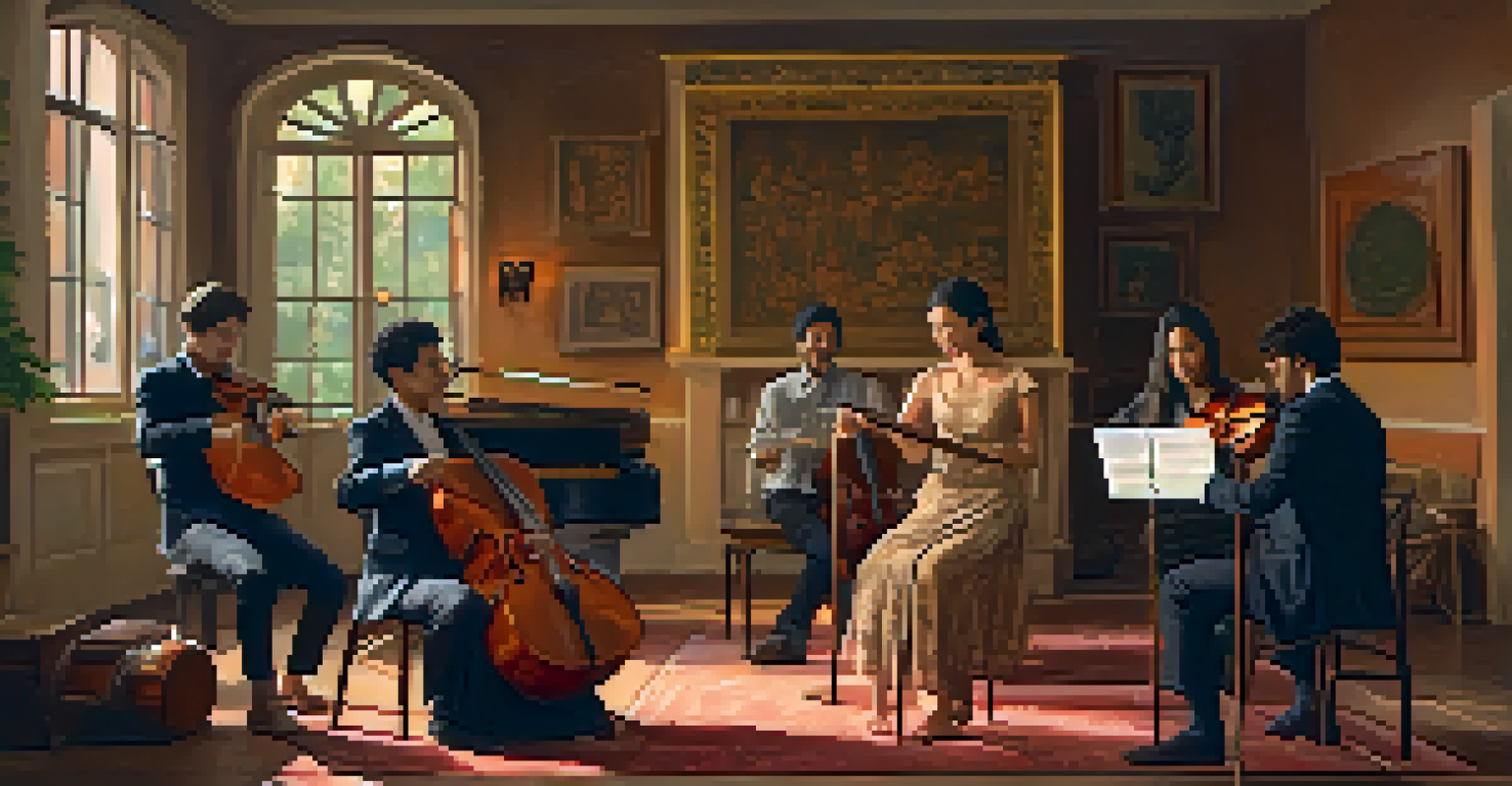Cultural Exchange Through Music: Case Studies Worldwide

The Universal Language of Music and Its Impact
Music is often referred to as a universal language, transcending barriers and connecting people from diverse backgrounds. This shared experience fosters a sense of community and understanding, allowing individuals to express emotions and stories without the need for words. For instance, genres like reggae and hip-hop have roots in specific cultures but have resonated with audiences worldwide, illustrating music's ability to unite.
Music is the universal language of mankind.
When people from different cultures come together through music, they engage in a rich exchange of traditions, styles, and ideas. This interaction can lead to the fusion of musical elements, resulting in new genres that reflect a blend of influences. A prime example is the rise of world music, where artists incorporate traditional sounds and instruments from their heritage into contemporary formats.
Moreover, music festivals and events often serve as platforms for cultural exchange, showcasing artists from various backgrounds. These gatherings not only entertain but also educate audiences about different cultural practices, fostering respect and appreciation for diversity.
Case Study: The Influence of Afrobeat on Global Music
Afrobeat, a genre that originated in West Africa, exemplifies how cultural exchange can reshape musical landscapes. Pioneered by artists like Fela Kuti, Afrobeat combines traditional African rhythms with jazz, funk, and highlife, creating a vibrant sound that has captivated audiences worldwide. Its infectious energy has inspired countless musicians beyond Africa, leading to collaborations that highlight its global appeal.

In recent years, artists such as Beyoncé and Drake have incorporated Afrobeat elements into their music, demonstrating its influence on contemporary pop. This cross-pollination not only broadens the reach of Afrobeat but also introduces new listeners to its cultural significance. The genre acts as a bridge, connecting listeners to the rich history and social issues of its origins.
Music Unites Diverse Cultures
Music transcends barriers, fostering community and understanding through shared experiences and cultural exchange.
Furthermore, Afrobeat's rise has prompted a resurgence of interest in African culture and artistry, encouraging collaborations that celebrate this heritage. This underscores the potential of music to foster cultural pride and awareness while creating a shared space for dialogue and exchange.
Exploring the Impact of Reggae on Social Movements
Reggae music, deeply rooted in Jamaican culture, has long been a vehicle for social change and cultural expression. With its powerful messages of resistance and unity, reggae has transcended geographical boundaries, resonating with oppressed communities around the world. Artists like Bob Marley have used their platform to address issues such as inequality, peace, and love, making reggae synonymous with activism.
Where words fail, music speaks.
The genre's global reach has inspired movements in various countries, where reggae's rhythms and messages have been reinterpreted to reflect local struggles. For example, in South Africa, reggae played a significant role during the anti-apartheid movement, serving as an anthem for freedom and solidarity. This illustrates how music can galvanize social movements and foster a sense of collective identity.
As reggae continues to evolve, it remains a powerful tool for cultural exchange, connecting individuals through shared experiences and values. Its ability to transcend borders not only enriches global music but also promotes understanding and empathy across different cultures.
The Role of Folk Music in Cultural Preservation
Folk music serves as a vital link to cultural heritage, preserving stories, traditions, and values that might otherwise be lost. Across the globe, many communities use folk music to pass down their history and identity, ensuring that future generations remain connected to their roots. This form of cultural exchange is essential for maintaining the richness and diversity of global music.
For instance, the revival of traditional folk music in regions like Appalachia highlights the importance of this genre in contemporary society. Musicians often blend old melodies with modern influences, creating a unique sound that honors tradition while appealing to new audiences. This fusion allows folk music to remain relevant and accessible, further promoting cultural exchange.
Afrobeat's Global Influence
Afrobeat has reshaped the music landscape, inspiring collaborations that highlight its cultural significance and global appeal.
Moreover, folk music festivals provide platforms for artists to share their heritage with a wider audience. These events foster appreciation for diverse cultures and encourage collaboration, showcasing the beauty of cultural exchange through the universal medium of music.
Hip-Hop: A Global Movement of Expression and Identity
Hip-hop, originating in the Bronx during the 1970s, has evolved into a global phenomenon that reflects the voices of marginalized communities. Its elements—rapping, DJing, graffiti art, and breakdancing—serve as forms of self-expression and storytelling, often addressing social issues and personal experiences. As hip-hop spreads across the world, it adapts to local cultures while maintaining its core message of resilience and empowerment.
In countries like France and Brazil, hip-hop has become a powerful tool for social commentary, addressing issues such as inequality, racism, and political oppression. Artists from these regions have successfully merged their cultural experiences with hip-hop, creating unique sounds that resonate with their audiences. This cultural exchange enriches the genre and highlights the universality of its themes.
Additionally, hip-hop culture encourages collaboration among artists from different backgrounds, fostering a sense of community and solidarity. By sharing their stories and experiences, these artists contribute to a global dialogue that transcends borders, illustrating the power of music as a catalyst for cultural exchange.
Classical Music: Bridging Cultures Through Collaboration
Classical music, often seen as a bastion of Western culture, has increasingly embraced collaboration with diverse musical traditions. This fusion not only enriches the classical genre but also promotes cultural exchange by introducing audiences to new sounds and perspectives. Collaborations between classical musicians and artists from various backgrounds create innovative works that celebrate cultural diversity.
One notable example is the collaboration between Yo-Yo Ma and traditional musicians from different cultures, such as the Silk Road Ensemble. This project emphasizes the interconnectedness of music and highlights how different traditions can inform and inspire one another. Through these collaborations, classical music becomes a platform for dialogue and understanding.
Digital Age Enhances Musical Exchange
The digital age allows for unprecedented access to diverse music, promoting cultural exchange and connection among global audiences.
Furthermore, classical music festivals increasingly feature diverse artists, showcasing a broad spectrum of cultural expressions. These events not only entertain but also educate audiences about the richness of global musical traditions, fostering appreciation for the beauty found in cultural exchange.
The Digital Age: Music as a Tool for Global Connection
In today's digital age, music serves as a powerful tool for cultural exchange, breaking down geographical barriers and connecting people worldwide. Streaming platforms and social media allow artists to share their music with global audiences, facilitating collaborations that might not have been possible in the past. This accessibility has transformed the way we experience and appreciate music from different cultures.
For example, platforms like YouTube have given rise to viral trends, where artists from diverse backgrounds can share their unique sounds and styles. These trends often lead to cross-cultural collaborations, where musicians blend their influences to create something entirely new. This not only enriches the global music landscape but also promotes understanding and appreciation for different cultures.

Additionally, the digital age allows listeners to discover and engage with music that reflects their cultural heritage, fostering a sense of identity and belonging. As music continues to evolve in this interconnected world, it remains a vital medium for cultural exchange, celebrating the rich tapestry of human experience.